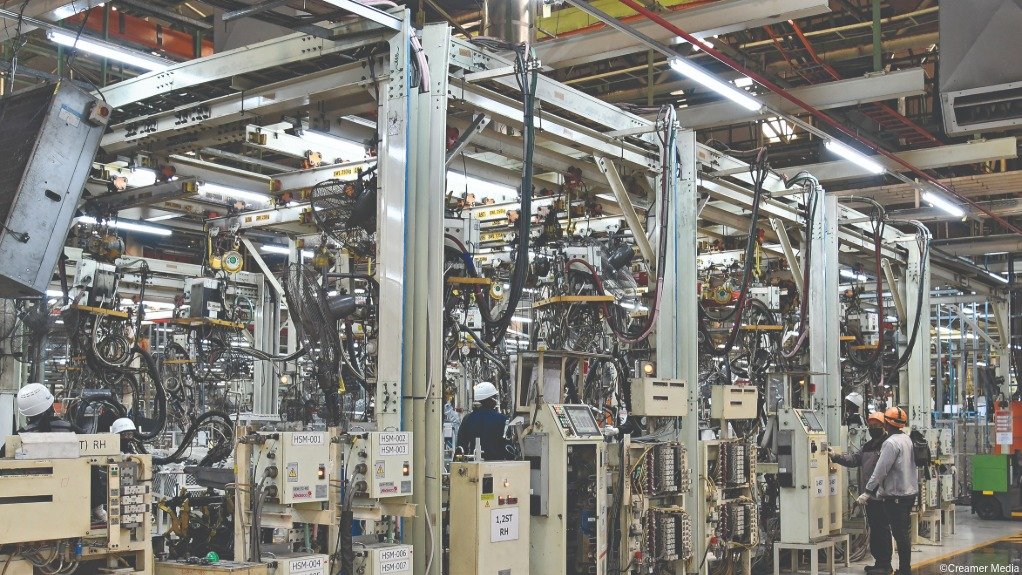To counter sluggish global growth and rising trade fragmentation, deeper and more sustainable industrialisation is increasingly being viewed as the route to inclusive development, prompting the high-level Business 20 (B20) South Africa Industrial Transformation and Innovation Task Force to develop a report outlining recommendations to accelerate this shift.
Centred on revitalising manufacturing as a driver of resilience, the report offers three key recommendations: driving industrial growth through strategy and innovation, broadening and deepening value chain capabilities, and adopting sustainable technologies and digitalisation.
It emphasises industrial strategies co- created with business, greater competitiveness among small and medium-sized enterprises, and deeper regional trade integration.
The report also highlights the need for green and digital technology adoption, supported by finance, infrastructure and institutional coordination.
The B20 serves as the official G20 dialogue forum with the global business community, and comprises several task forces responsible for developing business-driven, actionable policy recommendations for presentation to G20 leaders.
South Africa assumed the G20 presidency on December 1, 2024, and will become the first African country later this week to host the G20 Leaders’ Summit, on November 22 and 23.
“Industrialisation remains the most powerful driver of economic transformation. It builds resilience to shocks, drives inclusive growth and is the proven pathway to prosperity,” Toyota South Africa Motors CEO Andrew Kirby tells Engineering News & Mining Weekly.
Kirby chaired the task force that drafted the report.
He argues that services alone cannot absorb labour at scale or sustain competitiveness, adding that there is a need for industrialisation, which raises per capita incomes, enabling economies to move up value chains and sustain long-run competitiveness.
“Evidence shows that strong and continued GDP growth always follows strong manufacturing-led development,” he adds.
“All high-income economies globally have secured their initial wealth through industrialising. This created employment and consistently increased productivity, structurally transforming the economies and their underlying social structures,” says Gordon Institute of Business Science associate professor Justin Barnes, who was a subject matter expert in the working group for the report.
Kirby echoes this sentiment, emphasising that no leading economy has grown without a solid industrial base, and that almost every economy that achieved sustained growth of more than 7% a year over 25 years did so through manufacturing.
Manufacturing-led industrialisation, Kirby highlights, is consistently linked to long-term growth, income and innovation.
Alternative routes to development for emerging economies are limited, especially those with large populations, Barnes points out.
“The task force recommendations are essentially a call to action in respect of the evidence-based, empirically verified value of industrialisation. This value is key to the development of Africa . . . and South Africa specifically,” Barnes emphasises.
According to economic data provider Trading Economics, South Africa’s yearly GDP growth rate averaged 2.32% from 1994 to 2025.
Rebuilding South Africa’s manufacturing sector, he argues, should lie at the heart of its economic development plan, as the country’s economic stagnation closely mirrors its manufacturing decline.
Kirby stresses that the country is neither on the sidelines nor starting from zero: “We . . . have world-class industrial capabilities. The task now is to protect what we’ve built and use it as a launchpad for the next era of industrial growth.”
He points to the country’s successful industrial ecosystems, exemplified by “the automotive industry as a global benchmark of what coordinated policy, local manufacturing capability and strong public–private collaboration can achieve”.
This sector exports to more than 150 countries and has deep supplier networks, advanced technologies and globally recognised quality standards, which Kirby cites as proof that South Africa can compete globally under the right conditions.
However, he highlights that the country’s industrial base is under pressure, warning that further weakening would have a detrimental impact on jobs, skills and long-term competitiveness.
Kirby therefore advocates for protecting existing ecosystems and expanding them to catalyse new industries, such as new-energy vehicles, electronics, and advanced minerals and materials processing.
“South Africa has already demonstrated excellence in industrial capability; now we need to scale it, replicate it and modernise it,” he stresses.
Recommended Approach
A key finding in the report is that countries such as South Africa need to build or repair the foundations that enable the broadening and deepening of industrial value chains – such as skills, infrastructure, energy and water supply – while working with specific sectors and value chains – including automotive, clothing, food and beverage, and electronics – to support specific development challenges and opportunities, Barnes notes.
The task force is also advocating for stronger public–private partnerships, clear regulatory standards across regions, and investment in infrastructure that connects countries, rather than divides them, Kirby points out.
“Whether we look at Germany’s supplier networks, Vietnam’s export zones or Ethiopia’s industrial parks, the lesson is the same – when we connect local capability with global opportunity, we build growth that benefits everyone.”
The world’s most resilient supply chains are built on regional cooperation and shared capability, and there is a need to continue to pursue this amid rising barriers to trade and growing geopolitical risk, Kirby adds.
“We can only build resilient global supply chains if we move from competition to co- creation – because shared prosperity is now the most secure form of prosperity.”
He further says that there is clear appetite from global business leaders to invest, innovate and build, but this requires the correct partnership with government to deliver.
“Our work brought together voices from manufacturing powerhouses like Germany and South Korea, fast-growing industrial hubs like Vietnam and Mexico, and emerging innovation regions in Africa and Latin America. Despite different starting points, every country agreed that the next wave of industrial growth depends on collaboration, innovation and clear execution – not just policy documents,” Kirby comments.
The report asserts that reforms should be embedded in national planning frameworks and supported by investment in skills and delivery capacity that leverages the strengths of government and business.
Calls for Collaboration
Successful industrial case studies hinge on the consistent application of attentive actions and policies that respond to private-sector signals and social priorities, says Barnes.
“South Africa will not re-industrialise by accident; it will only do so through careful, deliberate actions and policies that align with global, regional and local market imperatives. This requires competent local and national government working in close collaboration with an engaged private sector that is incentivised to grow and sustainably improve its competitiveness,” he emphasises.
Where public and private sectors share accountability, industrial transformation has proven successful – evidence that this is not merely a theoretical concept, Kirby says.
“In Vietnam, long-term planning and close cooperation with industry helped build one of the world’s most successful electronics manufacturing bases. In Germany, innovation clusters bring together suppliers, universities and government to co-create new technologies.”
These examples, he says, show that industrial strategies become engines of real growth when businesses are included from the beginning, and not just consulted at the end.
Kirby calls for public–private partnerships to begin immediately, with potential for rapid progress. He also advocates for a future-focused industrial policy, with investments in digital skills, Industry 4.0, green technologies and resilient supply chains, aligned to global trends such as cleaner manufacturing, AI-driven production and circular economies.
This presents an opportunity for inclusive and sustainable development to further catalyse economic growth.
“Governments should institutionalise foresight systems with periodic reviews (three to five years) to track technology and market shifts, which would keep the policies adaptive to market shifts,” he adds.
Formula for Success
Kirby and Barnes also provided insight into the B20 task force process and how the report was developed.
Kirby was supported by ten co-chairs from several industries and countries.
“The B20 follows a set cadence of monthly task force meetings, with research support from knowledge and network partners. The focus was to surface key challenges in a sector or economic area, and test potential solutions. In our meetings, we then debated topics and prioritised which areas could be recommendations to be handed over to the G20,” he explains.
The group boasted a diverse 110-member community in manufacturing, energy, green industries, pharma, packaging and finance.
Discussions were anchored in case studies across three industrial contexts – foundational, accelerating and advanced – designed to be relevant for nations across the G20 with varied starting points.
The task force also developed key performance indicators – such as growth in manufacturing value-add, productivity and sharing medium- and high-tech output – to ensure that recommendations are measurable and trackable, Kirby informs.
Central to the process was leveraging international case studies and benchmarks to guide how South African and broader international complexities could be managed, Barnes notes.
EMAIL THIS ARTICLE SAVE THIS ARTICLE ARTICLE ENQUIRY FEEDBACK
To subscribe email subscriptions@creamermedia.co.za or click here
To advertise email advertising@creamermedia.co.za or click here



















